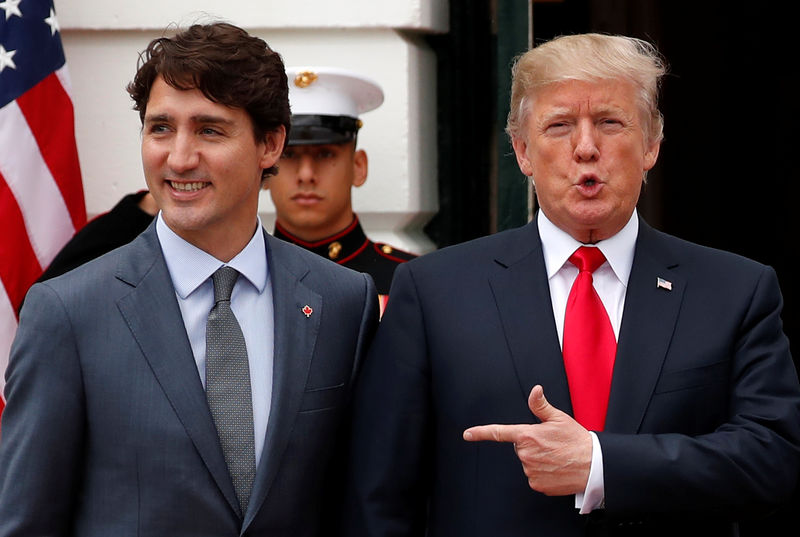Investing.com - Trade-related headlines will continue to drive market sentiment in the week ahead, as investors watch further developments in the ongoing trade spat between the U.S. and its major trading partners.
Trade-war fears have been simmering for months, with investors jittery over the prospects of further escalation in tensions having an impact on the global economy.
Besides trade rhetoric, the monthly U.S. jobs report, which is expected to remain in territory consistent with a strengthening labor market, will be the highlight of the holiday-shortened week.
U.S. markets will remain closed on Monday for the Labor Day holiday.
Meanwhile, market participants will also be looking ahead to monthly trade figures out of China to see if the ongoing conflict with the U.S. had any impact on exports and imports in August.
Elsewhere, in what will be a quiet week for European economic data, investors will focus on a report on activity in the UK's dominant services sector for further indications on the continued effect that the Brexit decision is having on the economy.
On the central bank front, a monetary policy announcement from the Bank of Canada will be in the agenda, though no change in expected.
Ahead of the coming week, Investing.com has compiled a list of the five biggest events on the economic calendar that are most likely to affect the markets.
1. U.S.-Canada Trade Talks
Talks between the United States and Canada aimed at reaching a deal to revamp the North American Free Trade Agreement (NAFTA) ended on Friday with no agreement, but discussions are expected to continue this week, according to a person familiar with the matter.
The Trump administration had given Canada until Friday to join a preliminary deal it reached earlier in the week with Mexico or risk being left out.
U.S. President Donald Trump tweeted on Saturday that there was no need to keep Canada in NAFTA and warned Congress not to meddle with the trade negotiations or he would terminate the trilateral trade pact altogether.
U.S. lawmakers on Friday said that a deal with Mexico could struggle to win approval from Congress unless Canada was also included. Support from Democrats would be needed to pass a purely bilateral deal, they said.
Investors will also be keeping abreast of the ongoing U.S.-China trade dispute to see if any more news materializes following a report that President Trump was prepared to impose tariffs on an additional $200 billion of Chinese goods as soon as this week.
2. U.S. Jobs Report
The U.S. Labor Department will release the nonfarm payrolls report for August at 8:30AM ET on Friday, and it will be watched more for what it says about wages than hiring.
The consensus forecast is that the data will show jobs growth of 190,000, after adding 157,000 positions in July, while the unemployment rate is seen inching down to 3.8% from 3.9%.
However, most of the focus will likely be on average hourly earnings figures, which are expected to rise 0.2%, a tad slower than the 0.3% increase a month earlier.
On an annualized basis, wages are forecast to increase 2.7%, the same gain reported in July.
Top-tier data on ADP private sector payrolls, car sales, trade figures, construction spending and the ISM surveys on manufacturing and service sector activity will also be on the agenda.
Economists reckon the data will do little to alter expectations that the Federal Reserve will hike interest rates two more times this year, with the next move higher coming at its September 25-26 meeting.
3. China Trade Figures
China is to release August trade figures on Friday morning.
The report is expected to show that the country’s trade surplus widened to $39.3 billion last month from $28.1 billion.
Exports are forecast to have climbed 10.0% from a year earlier, while imports are expected to rise 18.7%.
In addition to the trade data on Friday, the Asian nation will also publish a report on foreign exchange reserves.
Recent data has started to show that the world’s second largest economy may be losing steam, raising concerns about the potential fallout from a full-blown U.S.-China trade war.
4. UK Services PMI
A survey on Britain's giant services sector due at 0830GMT (4:30AM ET) on Wednesday is forecast to rise to 53.9 in August from the previous month's reading of 53.5.
Separate PMIs for the manufacturing and construction industries are due on Monday and Tuesday respectively.
The Bank of England raised interest rates last month, but signaled it was in no hurry to lift them further as Britain heads for Brexit next year with no clear plan for leaving the European Union.
With less than eight months until Britain leaves the EU, the government has yet to agree a divorce deal with Brussels and has begun talking more publicly about the prospect of leaving the bloc without any formal agreement on what happens next.
5. Bank of Canada Rate Decision
Faced with a still-uncertain outlook for Canada's future trade arrangements with the United States, the Bank of Canada is likely to leave interest rates unchanged at 1.50% at the conclusions of this week's meeting.
The BoC's policy decision is due at 10:00AM ET on Wednesday.
The central bank has raised rates twice this year, in January and May, amid evidence the economy is broadly performing well.
Most who have a view on the next rate rise say it will likely come at the BoC's October meeting, while a handful of others say Governor Stephen Poloz and other policymakers won't raise rates again until early 2019.
Canadian trade and employment figures will also capture some attention this week.
Stay up-to-date on all of this week's economic events by visiting: http://www.investing.com/economic-calendar/
